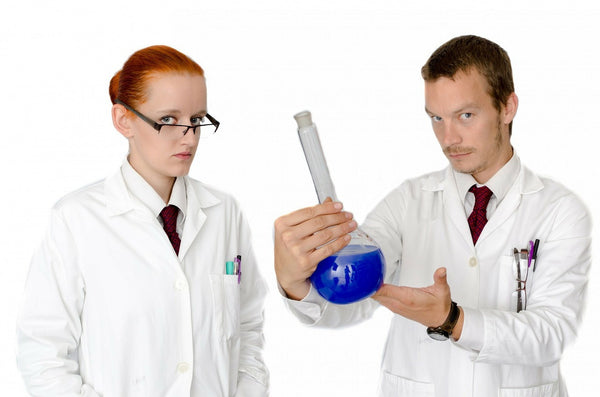Growth Hormone Use: Is it Worth It? Does it Work?

We all want to look better, feel younger, and live longer.
It’s no surprise that people have been chasing after the shortcut to these goals for thousands of years.
In the pursuit of the fountain of youth, people have gone to excessive lengths including using harmful and deadly means. Nowadays, we have science.
Science has allowed us to tap into the wonders of our bodies while opening up the knowledge on what is needed for a long and healthy life such as great nutrition and exercise.
Everybody wants a shortcut though and science has helped us with that as well.
Introducing Human Growth Hormone.
Naturally produced in the body as Human Growth Hormone (HGH), the synthetic version of growth hormone is being praised by some as the key to more muscle, youth, and longevity.
Is it worth it though?
Does growth hormone really produce incredible results?
What health complications might arise from using a synthetic version of it?
Let’s take a look at what growth hormone is and how it may help with common fitness and lifestyle goals.

WHAT IS GROWTH HORMONE?
As the name implies, modern day growth hormone is a synthetic compound that mimics the effects of its natural counterpart, Human Growth Hormone.
HGH, the one naturally found in your body, is produced in the pituitary gland. The body secretes HGH as needed to facilitate natural growth stages, recovery, cell repair, and many other processes. The point is that natural levels of HGH are great as they support your health. In the early 1900s, scientists were extracting natural HGH from human corpses and using it to stimulate growth in underdeveloped children. (Sounds great, right?)
This method ended abruptly when scientists discovered they were giving contaminated batches to kids. Knowing the benefit of HGH, researchers set to work on creating a synthetic, bacteria-based form of growth hormone. During the late 1970s, early 1980s, growth hormone, the one not from humans or dead bodies, was born.
OUTSIDE THE MEDICAL FIELD
Knowing the role that Human Growth Hormone plays in the body when it comes to recovery and delivering an anabolic environment, it wasn’t just concerned doctors and scientists who were interested in it.
Growth hormone has been the subject of numerous studies since its release almost 40 years ago. Let’s take a look at the common reasons people want to take growth hormone and the studies behind it to see if it’s worth the time, money, and potential consequences.

GROWTH HORMONE FOR MUSCLE MASS
It’s no surprise that growth hormone found its way into the world of sports, with an emphasis on competitive bodybuilding. Highlighted in numerous studies as a way to successfully increase muscle mass and support recovery, it became commonplace in numerous sports-settings.
What about today? Have modern studies confirmed the benefits of synthetic growth hormone as a potent muscle builder?
This is where things are not as clear cut as you’d expect. Sure, there are plenty of testimonials citing the amazing muscle-bound benefits of using growth hormone but what does the science say?
The answer is two-fold: Yes, growth hormone does increase muscle mass. No, it doesn’t appear to increase muscle mass in the population who wants it most.
There are numerous studies that show how the administration of growth hormone to specific populations of people can indeed increase lean muscle tissue. For example, children who have stunted growth and elderly men who are deficient in natural growth hormone.
Studies performed on healthy, well-trained adults don’t seem to reflect the notion that is so wildly popular in the shady part of the fitness industry today. That is, growth hormone has yet to consistently demonstrate itself as an effective way to increase actual lean muscle tissue in young healthy adults. (1-2)
Sure, fluid mass increases, which may give the appearance of increased muscle mass. The catch is that once you stop supplementing with synthetic growth hormone, you’ll lose those “gains.”
Growth hormone isn’t going to turn you into the next Phil Heath but if you are an older guy with lagging hormone levels, it may be a viable solution. In other words, if you’re a young guy, seek your muscle building supplements elsewhere.

SPORTS PERFORMANCE AND GROWTH HORMONE
With growth hormone being so prevalent in the sports industry, there has to be a reason outside of trying to gain more lean muscle mass, right?
Another general consensus about synthetic growth hormone is that it can dramatically increase strength, power, and speed. These are three things that every serious athlete is going to need regardless of the sport. Again, most of what you hear comes from testimonials. Does the research back this up?
Not really. Historically, studies have failed to consistently demonstrate a connection between synthetic growth hormone use and increased performance. (1-2)
To play devil’s advocate: A recent study out of Australia claims they have demonstrated the performance enhancing properties of growth hormone; however, the results weren’t even close to what you hear floating around the pop-fitness industry.
The study showed that young, healthy, and physically-fit subjects who took growth hormone showed an increase in sprint speed while on the stationary bike. How much of an increase? Up to 4%.
You could argue that 4% is the difference between winning and losing but is it really? Considering the monetary cost of growth hormone, not to mention the potential side effects, I’d argue it’s tough to justify a 4% increase in speed. (3)
Case in point, as of now, there are no credible and consistent studies showing the performance enhancing benefits of growth hormone. Want to run faster? Keep practicing.

LONGEVITY AND GROWTH HORMONE
Last but not least, let’s address the idea that growth hormone is the modern-day fountain of youth.
Growth hormone exploded into popular health culture as a way to boost longevity during the 90s. Why?
There was a small-scale study was published, misinterpreted, and broadcast for the world to see. The study cited numerous benefits of growth hormone including increased muscle mass and overall well-being. This lit the growth hormone fire, resulting in the idea that scientists finally discovered the simple solution to living longer. (4)
Subsequent studies were not as convincing. Many of the studies pointed out that the use of growth hormone for healthy elderly men produced little to no benefit. In fact, it was just the opposite.
First, adults who receive regular treatments of growth hormone have a potential risk for side effects including pain, fluid retention, and carpal tunnel syndrome. What’s more, another study demonstrated that mice who were deficient in growth hormone actually lived longer than their healthy, growth hormone-loving counterparts. (5-6)
This raises a lot of questions into the true nature and role of growth hormone in the body. For now though, if you want to live forever, you better get back to searching for that legendary fountain of youth. People seem convinced that it’s in Florida.
Tell Us What You Think!
Have you tried growth hormone before?
What benefits (if any) did you notice?
Let us know in the comments below!
References
- Velloso, C. P. "Regulation of Muscle Mass by Growth Hormone and IGF-I." British Journal of Pharmacology. Nature Publishing Group, June 2008. Web. 13 June 2017.
- Hintz, Raymond L. "Growth Hormone: Uses and Abuses: It Has Anabolic Effects, but Its Use in Ageing and Other Conditions Is Not Established." BMJ : British Medical Journal. BMJ Publishing Group Ltd., 17 Apr. 2004. Web. 13 June 2017.
- Effects of Growth Hormone Doping on Athletic Performance. Ann Intern Med. 2010;152:I-44.doi: 10.7326/0003-4819-152-9-201005040-00003
- Rudman D, Feller AG, Nagraj HS, et al. Effects of human growth hormone in men over 60 years old. N Engl J Med. 1990;323:1–6.
- Ginzburg, Enrique, Nancy Klimas, Chad Parvus, Jeff Life, Robert Willix, Michale J. Barber, Alvin Lin, and Florence Comite. "Long-term Safety of Testosterone and Growth Hormone Supplementation: A Retrospective Study of Metabolic, Cardiovascular, and Oncologic Outcomes." Journal of Clinical Medicine Research. Elmer Press, Aug. 2010. Web. 13 June 2017.
- Bartke, Andrzej. "Growth Hormone and Aging: A Challenging Controversy." Clinical Interventions in Aging. Dove Medical Press, Dec. 2008. Web. 13 June 2017.
0 comments











